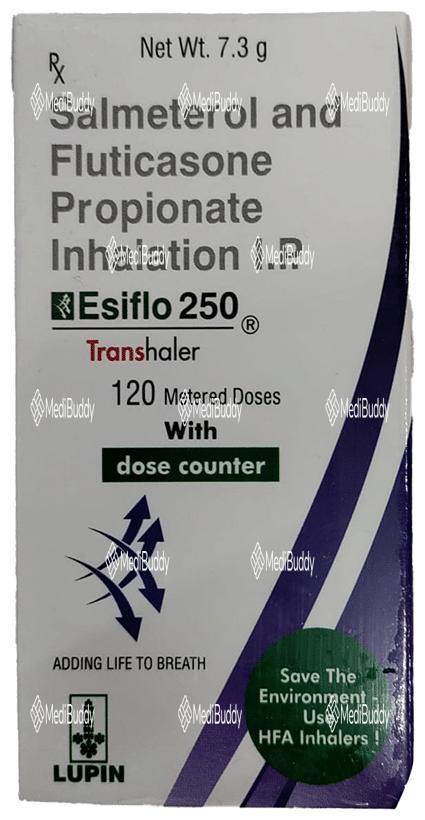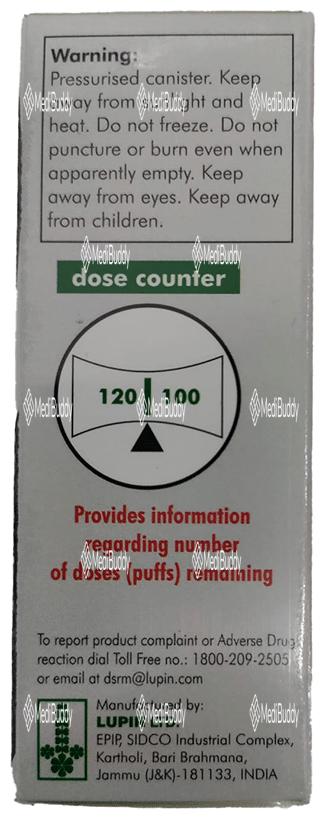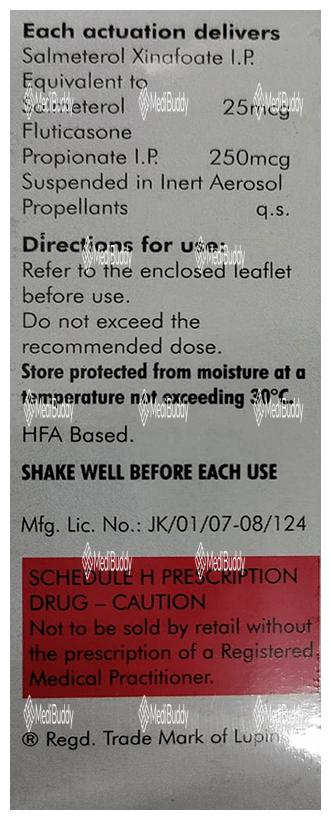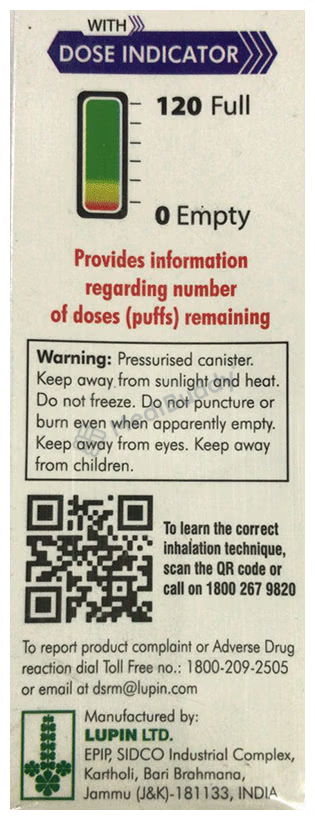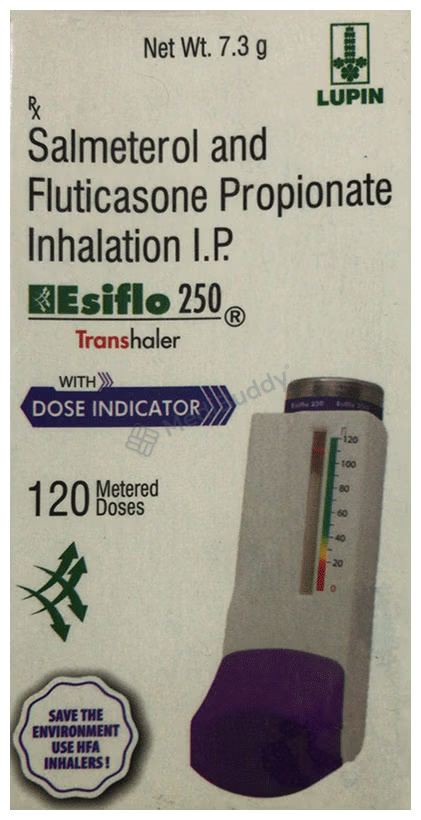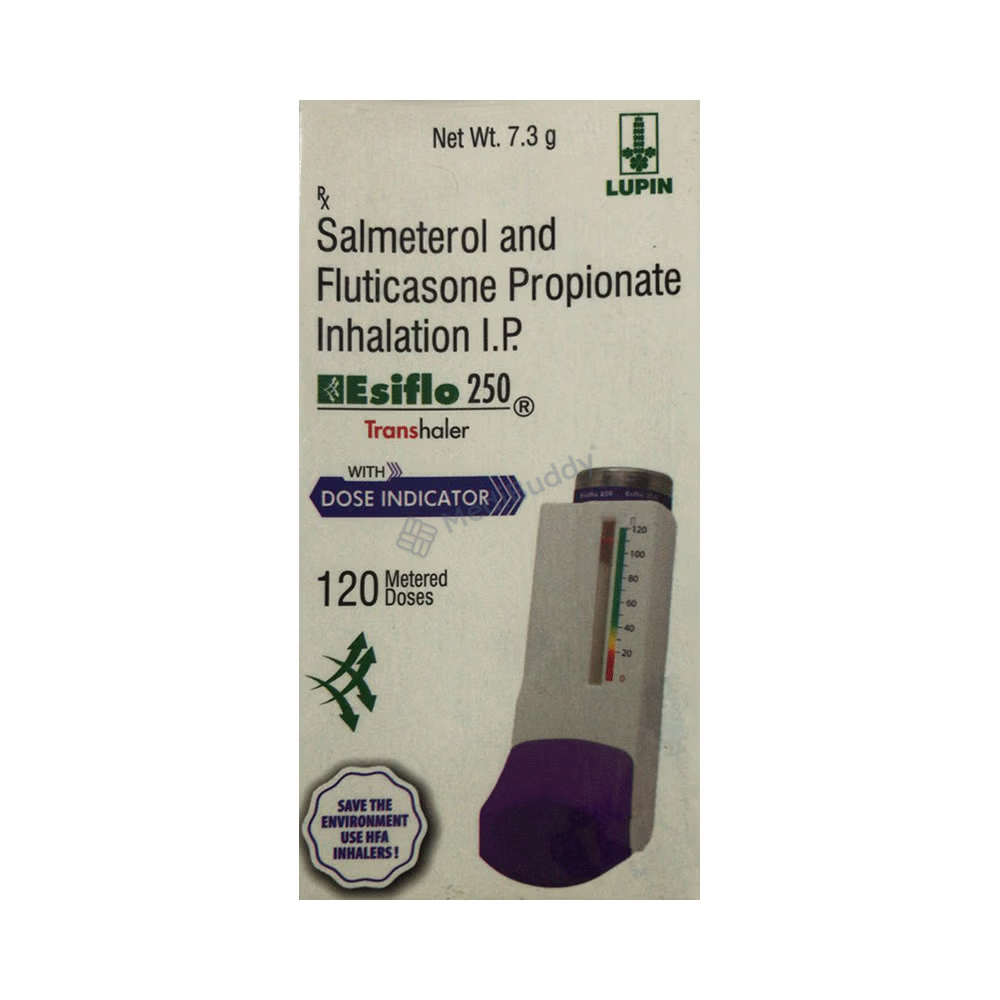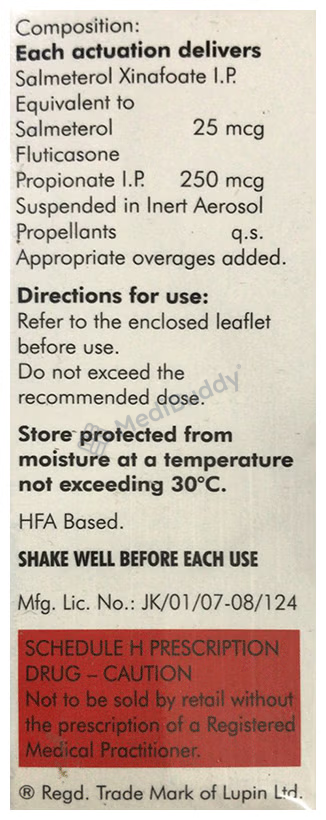Esiflo 250 Transhaler
By Esiflo
Rx
120mdi Transhaler in a Packet

Composition
Salmeterol(25mcg) + Fluticasone Propionate(250mcg)

Manufacturer - Lupin Ltd
Lupin Ltd, 3rd floor Kalpataru Inspire, Off. W E Highway, Santacruz (East), Mumbai 400 055. India

Expires on or after
November, 2026
About Esiflo 250 Transhaler
Esiflo 250 Transhaler, a respiratory medication, is primarily utilized to manage and prevent conditions like asthma and chronic obstructive pulmonary diseases (COPD). Asthma is a long-term respiratory ailment where the airways narrow, swell, and produce excess mucus, causing breathing difficulties. On the other hand, COPD encompasses various lung diseases that obstruct airflow, resulting in symptoms like wheezing, coughing, and shortness of breath.
Containing a combination of Salmeterol, a bronchodilator, and Fluticasone propionate, a corticosteroid, Esiflo 250 Transhaler works by relaxing airway muscles and reducing inflammation, respectively. By widening the airways and curbing inflammatory responses, this medication eases breathing difficulties associated with asthma and COPD.
Administered via inhalation only, Esiflo 250 Transhaler should be used according to your doctor's guidance. Consistent use is key to its effectiveness, as it may take time to reach its full potential. Remember, this medication is not for sudden asthma attacks; instead, rely on a quick-relief inhaler if such an event occurs.
It's essential to be aware of possible side effects like headaches, respiratory infections, and muscle pain. While most of these effects are self-limited, persistent symptoms should be discussed with your healthcare provider. To avoid potential side effects, consider proper inhaler technique and seek advice from your doctor if you encounter concerns.
Before using Esiflo 250 Transhaler, share relevant medical history such as lung disorders, liver issues, or heart conditions. Pregnant or breastfeeding individuals should seek medical advice before initiating treatment. Additionally, inform your doctor about existing conditions like diabetes or hypertension, as they may impact the medication's suitability for you.
Remember, this medication is for regular use as prescribed and should not be discontinued abruptly. Always consult your doctor before making any changes. Esiflo 250 Transhaler can provide relief and management for respiratory conditions when used correctly and in line with medical advice.
Benefits
Esiflo 250 Transhaler, a medication used in the treatment of chronic obstructive pulmonary disease (COPD) and asthma, offers various benefits to individuals suffering from these conditions. By helping to keep the airways in the lungs open, this medication aids in relaxing the muscles surrounding them. This mechanism makes it easier for air to flow in and out, effectively relieving symptoms such as chest tightness, shortness of breath, wheezing, and coughing. With Esiflo 250 Transhaler, individuals can find relief and carry out their daily activities more comfortably.
In the treatment of asthma, Esiflo 250 Transhaler plays a critical role in preventing the onset of asthma attacks, especially before triggers like exercise or exposure to allergens such as house dust, pollen, pets, and cigarette smoke. By using this medication, individuals can engage in physical activities without the fear of experiencing common asthma symptoms like wheezing, coughing, or shortness of breath. This enables them to lead a more active and unrestricted lifestyle, free from the constraints posed by their asthma symptoms.
Esiflo 250 Transhaler is a safe and effective option for managing respiratory disorders like asthma and COPD. By combining two active ingredients, Salmeterol and Fluticasone propionate, this medication works to improve pulmonary function and prevent the worsening of conditions like emphysema and chronic bronchitis. Salmeterol acts as a bronchodilator, relaxing the muscles in the airways and facilitating easier breathing. On the other hand, Fluticasone propionate, a corticosteroid, works by reducing inflammation in the bronchial tubes, providing relief from symptoms like sneezing, nasal congestion, and sinus discomfort.
Overall, Esiflo 250 Transhaler offers individuals with asthma and COPD the dual benefits of symptom relief and prevention, allowing them to manage their conditions effectively and lead a more fulfilling and active lifestyle. It is essential to follow your doctor's instructions and not discontinue the use of this medication without their guidance to ensure optimal outcomes in the treatment of your respiratory condition.
How to use the Esiflo 250 Transhaler
To use Esiflo 250 Transhaler properly, start by checking the label on the inhaler for specific directions. Before using, shake the inhaler gently. When you are ready, place the inhaler upright in your mouth without biting the mouthpiece, and insert it between your teeth. Breathe in through your mouth, pressing down on the top of the inhaler to release a puff of medication while continuing to inhale. Hold your breath for as long as comfortable after inhaling, and then breathe out slowly. If another puff is needed, wait for a minute before repeating the process.
Make sure to follow your doctor's recommended dosage - they will advise the correct dose, duration, and number of puffs based on your individual factors such as age, weight, and specific health condition. It's crucial to inhale the medication only through your mouth into your lungs, not through your nose. Use the Esiflo 250 Transhaler every day as instructed until your healthcare provider advises you to stop. Remember to follow the enclosed leaflet's instructions for proper usage.
After using the inhaler, rinse your mouth thoroughly with water and spit it out to prevent potential side effects. To maintain cleanliness and hygiene, always close the mouthpiece with the cover after each use. It's essential not to abruptly stop using this medication or change the dose without consulting your doctor, as it could worsen your breathing condition. If you encounter difficulties using the device, speak to your healthcare provider about the possibility of using a spacer device for improved inhalation.
Uses of Esiflo 250 Transhaler
The Esiflo 250 Transhaler is commonly used in the treatment of Chronic obstructive pulmonary disease (COPD) and Asthma. It is effective for managing the symptoms of these respiratory conditions. Esiflo 250 Transhaler is prescribed by healthcare professionals to help in the management and control of COPD and Asthma.
What conditions Esiflo 250 Transhaler treats?
Esiflo 250 Transhaler is used to treat asthma, a condition where the airways in the lungs narrow, swell, and produce mucus, causing breathing difficulties. It is also helpful for chronic obstructive pulmonary disease (COPD), a group of lung diseases like emphysema and chronic bronchitis that make breathing challenging. Emphysema causes shortness of breath, while chronic bronchitis involves inflammation of the bronchial tubes, affecting air passage to and from the lungs.
Should you consult a doctor?
When to seek Doctor:
It is crucial to seek medical advice before using Esiflo 250 Transhaler if you are experiencing conditions such as an over-active thyroid gland, diabetes, high blood pressure, hypokalemia (low potassium levels), seizures, osteoporosis, weak immune system, eye problems like glaucoma, infections like measles or chickenpox, glucose intolerance, adrenal gland issues, or if you have recently suffered a major trauma or undergone surgery. Additionally, Esiflo 250 Transhaler should not be used in cases of respiratory failure (status asthmaticus) or during acute asthma attacks. If you are experiencing any of these conditions or situations, consult your physician before using Esiflo 250 Transhaler for proper evaluation and guidance.
Side effects of Esiflo 250 Transhaler
When using Esiflo 250 Transhaler, you may experience a range of side effects, although most of them are temporary and fade away as your body gets used to the medication. Some common side effects include coughing, upper respiratory tract infections, nasal inflammation, sinus problems, stomach discomfort, fungal infections in the mouth or throat, voice changes, headaches, and dry mouth. You might also notice symptoms like low-grade fever, chest tightness, sinus pain, nausea, upset stomach, dizziness, nervousness, muscle and bone pain, sleeping issues, vomiting, or irregular heartbeat.
In some cases, more serious side effects may occur, such as increased blood sugar levels leading to diabetes, cloudy vision known as cataracts, rapid or irregular heartbeat, chest pain, anxiety or sleep disturbances, allergic skin rashes, thrush in the mouth or throat, sore tongue, hoarse voice, throat irritation, muscle or joint pain, easy bruising or fractures, sinus inflammation, low potassium levels, slowed growth in teenagers, bone weakening, glaucoma, weight gain, Cushing's Syndrome due to high cortisol levels, changes in behavior like increased activity and irritability, difficulty swallowing due to fungal infections in the esophagus.
It’s crucial to seek immediate medical attention if you observe severe allergic reactions such as wheezing, coughing, shortness of breath, skin rash, swelling of the face, lips, tongue, or throat, breathing difficulties, rapid heartbeat leading to fainting, lightheadedness, or loss of consciousness. Similarly, symptoms of pneumonia, including fever, chills, increased cough, breathing difficulties, excessive mucus production, and changes in mucus color, require prompt consultation with your healthcare provider. If any of these severe side effects occur, stop using Esiflo 250 Transhaler and contact your doctor right away.
Safety advice

liver
When considering the safety of using Esiflo 250 Transhaler in relation to liver health, it is essential to take certain precautions. While there have been no known interactions established specifically related to liver issues with this medication, it is still important to be cautious. It is recommended to consult with your healthcare provider for proper guidance before using Esiflo 250 Transhaler to ensure that it is safe for your liver health. Your doctor can provide personalized advice based on your individual health status and potential risks.

kidney
No interaction with kidney issues has been found for Esiflo 250 Transhaler.

alcohol
Consult your doctor when consuming alcohol with Esiflo 250 Transhaler.

driving
When using Esiflo 250 Transhaler, no interactions impacting driving are established. It is safe to drive while using this medication.

pregnancy
Esiflo 250 Transhaler may not be safe to use during pregnancy. Animal studies indicate potential harm to the developing baby. Your doctor will assess the benefits and risks before prescribing. Consult your doctor for more information.

breastfeeding
It is better to consult your doctor before using Esiflo 250 Transhaler.
Age above 75(Geriatrics)
Esiflo 250 Transhaler should be taken with caution in elderly patients (aged 65 years or above). Therefore, consult your doctor before using it. Proper dose adjustments and careful monitoring are required in such patients.
Age below 6 months(Pediatrics)
Esiflo 250 Transhaler is not recommended for use in children younger than 12 years of age. Kindly consult your doctor before using it.
Consumption warning before consuming Esiflo 250 Transhaler
Before using Esiflo 250 Transhaler 7.3 gm, inform your doctor if you are allergic to it or any of its ingredients. If pregnant, breastfeeding, or under 12 years old, consult your doctor before using. Some patients may experience worsened asthma symptoms, in which case seek medical help. Contact your doctor if you have vision issues while using this inhaler. Regular monitoring of potassium levels is advised as it may cause low levels. Inform your doctor if you have certain medical conditions before using, such as high blood pressure, diabetes, infections, thyroid issues, low potassium, eye problems, bone issues, tuberculosis, or heart, liver, or adrenal gland disorders.
Disease interactions
Esiflo 250 Transhaler, a medication in the form of a 7.3 gm powder for inhalation, may interact with certain health conditions. It is important to disclose to your doctor if you have high blood pressure, diabetes, chest or lung infections, hyperthyroidism, low potassium levels, glaucoma, cataracts, osteoporosis, tuberculosis, or issues with your heart, liver, or adrenal gland before using this inhaler. These pre-existing conditions may require special attention or adjustments in treatment to ensure the safe and effective use of Esiflo 250 Transhaler.
What if you forgot to take Esiflo 250 Transhaler?
If you forget to take a dose of Esiflo 250 Transhaler, take it as soon as you remember. But if it's close to the time for your next dose, skip the missed one and stick to your normal dosing schedule. Avoid taking a double dose to make up for the missed one. It's important to maintain a consistent schedule when using this medication.
What happens if you take overdose of Esiflo 250 Transhaler?
If you or someone else by mistake inhales too much Esiflo 250 Transhaler, it's important to seek immediate medical help. Overdosing on this medication can lead to various symptoms such as difficulty breathing, chest discomfort, rapid heart rate, tremors, lightheadedness, headaches, weakness in muscles, and joint pains. If any of these signs occur, contact your doctor or visit the hospital right away for proper evaluation and treatment.
Related lab tests
When using Esiflo 250 Transhaler, it can be important to monitor your absolute eosinophil count and complete blood count through related lab tests. These tests help in assessing different aspects of your health that may be affected by the use of the transhaler. Absolute eosinophil count measures the number of a specific type of white blood cells called eosinophils in your body. Eosinophils are involved in allergic reactions and asthma, so monitoring them can give insight into how your body is responding to the medication.
Additionally, the complete blood count test provides a comprehensive overview of different blood components like red blood cells, white blood cells, and platelets. This test can help detect conditions such as anemia, infections, and inflammatory disorders which may be influenced by the medication. By regularly checking these lab tests, healthcare providers can monitor your health status and make any necessary adjustments to your treatment plan.
Related Lab Tests:
1. Absolute Eosinophil Count
2. Complete Blood Count
Additional Information
| Habit Forming | No |
| Chemical Class | - |
| Therapeutic Class | RESPIRATORY |
| Action Class | - |
FAQs
Disclaimer
The information provided on this website is to the best of our abilities to ensure it is accurate, reliable, and reviewed by a team of professionals. It should not be used to diagnose, prevent, or cure any health problem. The information presented here is not intended to create a doctor-patient relationship or replace a registered medical practitioner's advice, diagnosis, or treatment. The absence or provision of any information or warning regarding any medicine should not be assumed as an implied or explicit assurance of safety or efficacy. We highly recommend consulting your registered medical practitioner for all queries or doubts related to your medical condition. Do not ignore professional medical advice or delay seeking it based on the content encountered on our website. We intend to support, not replace, the doctor-patient relationship.
₹860.85
₹956.5
10% OFF
Inclusive of all taxes
Content verified by

Dr. Upasana Bhatia
MBBS - General Medicine
Last update on 01-Oct-2024
